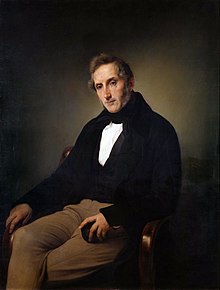
Back Alessandro Manzoni Afrikaans Alessandro Manzoni AN ألساندرو مانزوني Arabic الساندرو مانزونى ARZ Alessandro Manzoni AVK Alesandro Manzoni Azerbaijani آلساندرو ماندزونی AZB Алесандра Мандзоні Byelorussian Алясандра Мандзоні BE-X-OLD Алесандро Манцони Bulgarian
Alessandro Manzoni | |
|---|---|
 | |
| Senator of the Kingdom of Italy | |
| In office 29 February 1860 – 22 May 1873 | |
| Monarch | Victor Emmanuel II |
| Personal details | |
| Born | Alessandro Francesco Tommaso Manzoni 7 March 1785 Milan, Duchy of Milan |
| Died | 22 May 1873 (aged 88) Milan, Italy |
| Resting place | Monumental Cemetery of Milan |
| Nationality | Italian |
| Spouse(s) |
Enrichetta Blondel
(m. 1808; died 1833)Teresa Borri
(m. 1837; died 1861) |
| Children | Giulia Claudia (1808–1834) Pietro Luigi (1813–1873) Cristina (1815–1841) Sofia (1817–1845) Enrico (1819–1881) Clara (1821–1823) Vittoria (1822–1892) Filippo (1826–1868) Matilde (1830–1856) |
| Parent(s) | Pietro Manzoni and Giulia Beccaria |
| Relatives | Cesare Beccaria (grandfather) Massimo d'Azeglio (son-in-law) |
| Occupation | Writer, poet, dramatist |
| Writing career | |
| Period | 19th century |
| Genre | Historical fiction, tragedy, poetry |
| Subject | Religion, politics, history |
| Literary movement | Enlightenment Romanticism |
| Years active | 1801–1873 |
| Notable works |
|
| Signature | |
Alessandro Francesco Tommaso Antonio Manzoni (UK: /mænˈzoʊni/, US: /mɑːn(d)ˈzoʊni/, Italian: [alesˈsandro manˈdzoːni]; 7 March 1785 – 22 May 1873)[1] was an Italian poet, novelist and philosopher.[2] He is famous for the novel The Betrothed (orig. Italian: I promessi sposi) (1827), generally ranked among the masterpieces of world literature.[3] The novel is also a symbol of the Italian Risorgimento, both for its patriotic message[3] and because it was a fundamental milestone in the development of the modern, unified Italian language.[4] Manzoni also contributed to the stabilization of the modern Italian language and helped to ensure linguistic unity throughout Italy. He was an influential proponent of Liberal Catholicism in Italy.[5][6] His work and thinking has often been contrasted with that of his younger contemporary Giacomo Leopardi by critics.[7]
- ^ One or more of the preceding sentences incorporates text from a publication now in the public domain: Chisholm, Hugh, ed. (1911). "Manzoni, Alessandro Francesco Tommaso Antonio". Encyclopædia Britannica. Vol. 17 (11th ed.). Cambridge University Press. pp. 626–627.
- ^ Herbermann, Charles, ed. (1913). . Catholic Encyclopedia. New York: Robert Appleton Company.
- ^ a b "Alessandro Manzoni | Italian author". Encyclopedia Britannica. 25 March 2024.
- ^ "I Promessi sposi or The Betrothed". Archived from the original on 18 July 2011.
- ^ Pollard, John (2008). Catholicism in Modern Italy: Religion, Society and Politics Since 1861. Routledge. p. 18. ISBN 9780415238359.
- ^ DiScala, Spencer M. (2018). Italy: From Revolution to Republic, 1700 to the Present, Fourth Edition. Routledge.
- ^ Sergio Pacifici (1966). Poems and prose. Bloomington, Indiana: Indiana University Press. p. 9. ISBN 0253200946.